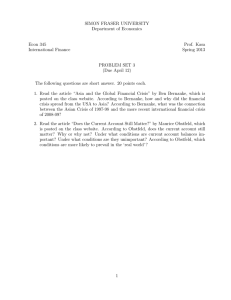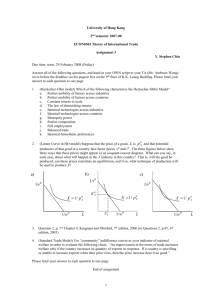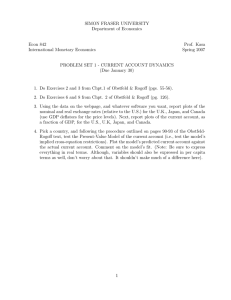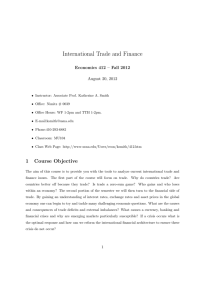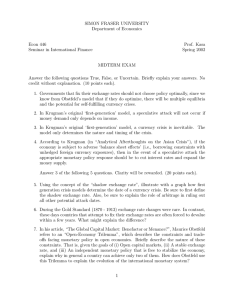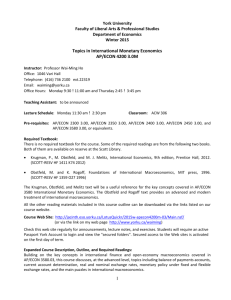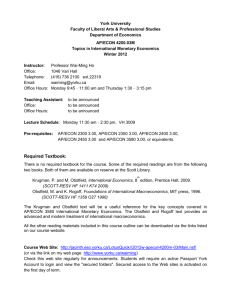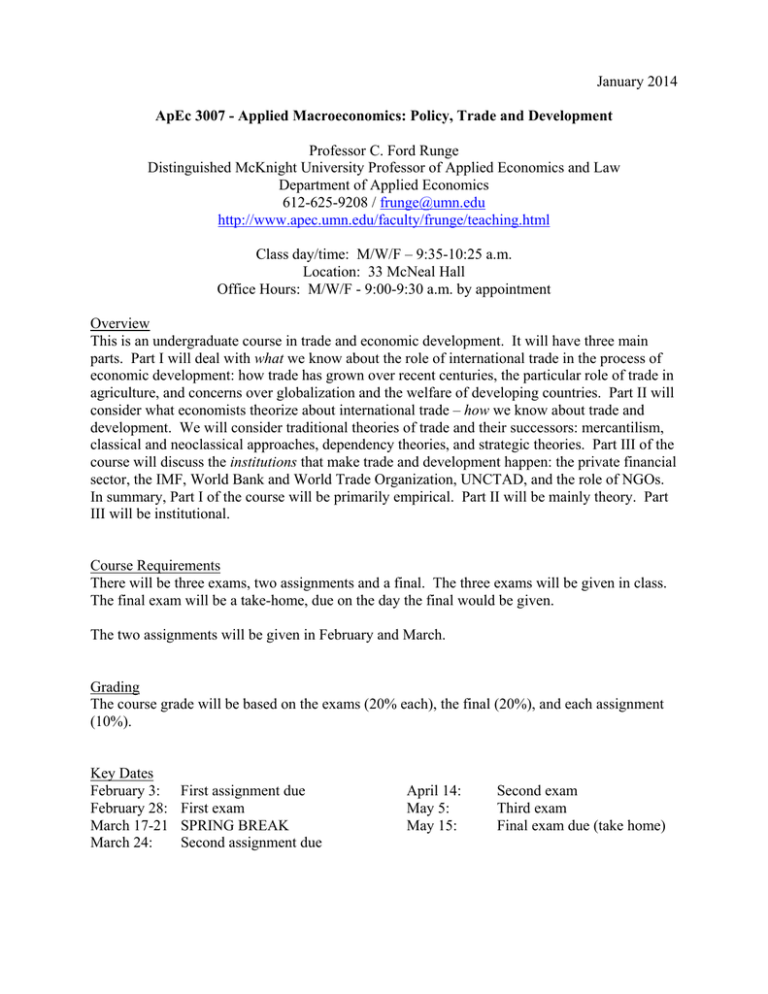
January 2014
ApEc 3007 - Applied Macroeconomics: Policy, Trade and Development
Professor C. Ford Runge
Distinguished McKnight University Professor of Applied Economics and Law
Department of Applied Economics
612-625-9208 / frunge@umn.edu
http://www.apec.umn.edu/faculty/frunge/teaching.html
Class day/time: M/W/F – 9:35-10:25 a.m.
Location: 33 McNeal Hall
Office Hours: M/W/F - 9:00-9:30 a.m. by appointment
Overview
This is an undergraduate course in trade and economic development. It will have three main
parts. Part I will deal with what we know about the role of international trade in the process of
economic development: how trade has grown over recent centuries, the particular role of trade in
agriculture, and concerns over globalization and the welfare of developing countries. Part II will
consider what economists theorize about international trade – how we know about trade and
development. We will consider traditional theories of trade and their successors: mercantilism,
classical and neoclassical approaches, dependency theories, and strategic theories. Part III of the
course will discuss the institutions that make trade and development happen: the private financial
sector, the IMF, World Bank and World Trade Organization, UNCTAD, and the role of NGOs.
In summary, Part I of the course will be primarily empirical. Part II will be mainly theory. Part
III will be institutional.
Course Requirements
There will be three exams, two assignments and a final. The three exams will be given in class.
The final exam will be a take-home, due on the day the final would be given.
The two assignments will be given in February and March.
Grading
The course grade will be based on the exams (20% each), the final (20%), and each assignment
(10%).
Key Dates
February 3:
February 28:
March 17-21
March 24:
First assignment due
First exam
SPRING BREAK
Second assignment due
April 14:
May 5:
May 15:
Second exam
Third exam
Final exam due (take home)
Texts
The main texts for the course will be:
- Krugman, Paul R., Maurice Obstfeld and Marc J. Melitz. 2012. International Economics:
Theory and Policy. 9th Edition. Boston: Addison-Wesley.
(On 2-hour reserve in Magrath Library and Wilson Library)
- O’Rourke, Kevin H. and Jeffrey G. Williamson. 1999. Globalization and History: The
Evolution of a Nineteenth-Century Atlantic Economy. Cambridge, MA: MIT Press.
(On 2-hour reserve in Magrath Library and Wilson Library)
ALSO: the APEC3007 Library Course Page is here:
https://www.lib.umn.edu/course/APEC/3007
(you will see this book listed - click on it to access the e-Book version)
- Roberts, Russell. 2007. The Choice. 3rd Edition. NJ: Pearson Prentice Hall.
(On 2-hour reserve in Magrath Library and Wilson Library)
- Readings can be accessed at this link through eReseve: https://reserves.lib.umn.edu/
(you will need to log in with your UofM x500 and password to view the page)
Introduction and Overview
Part I: What Do We Know About Trade and Development?
A.
A Political-Economic View (January 22-29)
- Krugman, Obstfeld and Melitz. Chapter 1, “Introduction,” pp. 1-9.
- Roberts, R. The Choice, pp. 1-53.
- Roberts, R. The Choice, pp. 54-124.
- Kearney, A.T., Inc. 2007. “The Globalization Index 2007.” Foreign Policy. A.T.
Kearney, Inc. and the Carnegie Endowment for International Peace.
FIRST ASSIGNMENT DUE: FEBRUARY 3
B.
Historical Perspective (February 3-7)
- O’Rourke, K.H. and J.G. Williamson. 1999. Globalization and History:
The Evolution of a Nineteenth Century Atlantic Economy. Cambridge, MA: MIT
Press. (Hereafter O’Rourke and Williamson) Chapters 1-2, pp. 1-28.
- O’Rourke, K.H. 1997. “The European Grain Invasion, 1870-1913.”
Journal of Economic History 57(4): 775-801.
2
C.
D.
Transportation Revolutions and Globalization (February 10-14)
-
O’Rourke and Williamson, Chapter 3, pp. 29-55.
-
Hofsommer, D.L. 2009. “Temples of Mammon and Hives of Industry –
RAILROADS and the Minneapolis Milling District.” Minnesota History
61(6)(Summer): 248-259.
The Corn Law Debate in the 19th Century (February 17)
- O’Rourke and Williamson, Chapter 5, pp. 77-92.
E.
Trade Policy and Growth (February 19-21)
- Harrison, A. 1996. “Openness and growth: A time-series, cross
country analysis for developing countries.” Journal of Development Economics
48: 419-447.
- Sundaram, J.K. and R. von Arnim. 2009. “Trade Liberalization and Economic
Development.” Science 323(January 9): 211-212.
F.
Protectionism in Practice: The Doha Round Debate (February 21-24)
- Runge, C.F. 2006. “Agriculture of Corruption.” The American Interest
Winter 2007 (Jan./Feb.): 1-10.
G.
Exam Review (February 26)
FIRST EXAM: February 28
Part II: How Do We Know About Trade and Development? Theories of Trade
A.
Mercantilism (March 3-7)
- LaHaye, Laura. “Mercantilism.” In The Concise Encyclopedia of Economics.
- Smith, A. 1976. “Of Restraints Upon the Importation from Foreign Countries
of Such Goods as can be Produced at Home.” An Inquiry into the Nature
and Causes of the Wealth of Nations. Vol. 1, Chapter II, pp. 452-472.
Oxford University Press.
B.
Ricardian Classicism – Absolute and Comparative Advantage (March 10-14)
- Suranovic, S.M. 1997. “The Theory of Comparative Advantage - Overview.”
International Trade Theory and Policy Lecture Notes.
3
SPRING BREAK: March 17-21
C.
A Simple Ricardian Model (March 24-28)
- Krugman, Obstfeld and Melitz, Chapter 3, “Labor Productivity and Comparative
Advantage: The Ricardian Model,” pp. 26-49.
- Krugman and Obstfeld, Chapter 4, “Specific Factors and Income Distribution,” pp. 50
79.
SECOND ASSIGNMENT DUE: MARCH 24
D.
Neoclassical Trade Theory: The Standard Trade Model (March 31-April 9)
- Krugman and Obstfeld, Chapter 5, “Resources and Trade: The Heckscher-Ohlin
Model,” pp. 80-110.
- O’Rourke and Williamson, Chapter 4, pp. 57-75.
E.
The Standard Trade Model continued (April 7-11)
- Krugman and Obstfeld, Chapter 5, “Resources and Trade: The Heckscher-Ohlin
Model,” pp. 80-110.
-Krugman and Obstfeld, Chapter 6, “The Standard Trade Model,” pp. 111-136.
SECOND EXAM: April 14
F.
External Economies of Scale and Imperfect Competition (April 16-23)
- Krugman and Obstfeld, Chapter 7, “External Economies of Scale and the International
Location of Production,” pp. 137-154.
-Krugman and Obstfeld, Chapter 8, “Firms in the Global Economy: Export Decisions,
Outsourcing, and Multinational Enterprises,” pp. 155-191.
G.
Exam Review (April 25)
THIRD EXAM: APRIL 28
Part III. National and International Instruments: International Trade Policy (April 30-May 9)
A.
The Instruments of Policy
- Krugman and Obstfeld, Chapter 10, “The Political Economy of Trade Policy,” pp.
219-255.
4
B.
International Institutions: the IMF, World Bank and WTO
International Monetary Fund (IMF)
- IMF. 2002. “Economic Prospects and Policy Issues.” World Economic Outlook April
2002: Recessions & Recoveries. Chapter 1, pp. 1-17.
- Welch, C. 1998. “The IMF and Good Governance,” The Progressive Response,
Vol. 2, No. 31, October 8.
The World Bank
- World Bank. “Overview of World Bank Activities in Fiscal 2001.” Annual Report
2001, Vol. 1, Chapter 1, pp. 25-35.
- Caulfield, C. 1998. “The World Bank.” The Progressive Response.
The World Trade Organization
- WTO. 2002. “Overview of developments in the international trading
environment: Trade policy trends in WTO Members.” Annual Report
2002, pp. 30-41.
- Krugman and Obstfeld. Chapter 12. “Controversies in Trade Policy,” pp. 271292.
FINAL EXAM DUE:
THURSDAY, MAY 15, 2014
1:30-3:30 p.m.
5

